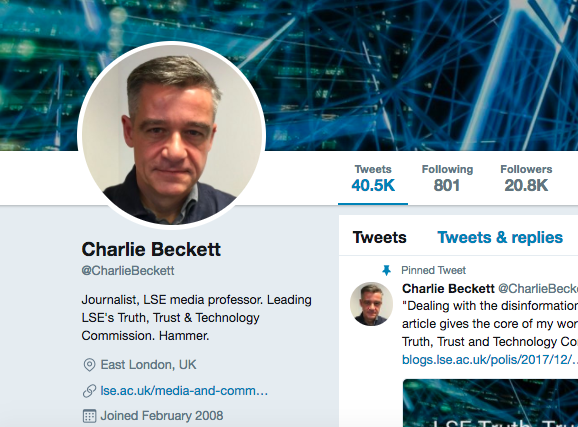How do we know about terror events? The news media. Social media. And that’s what the terrorist wants. You to know.
So what is the role of the news media in reporting on terror? How can they do it accurately and responsibly? And what is the role of the platforms like Facebook in filtering that information into your news streams?
I have written a report for the Tow Center at Columbia about this. Here’s an extract from the executive summary:
Terrorism is a brutal and violent practice, but it is also a media phenomenon. Terror is vital news: a dramatic, important story that the public needs to know about and understand. But terrorism also relies on such publicity to disrupt society, provoke fear, and demonstrate power. This problematic relationship predates digital technology. In 1999, American historian Walter Laqueur wrote:
It has been said that journalists are terrorists’ best friends, because they are willing to give terrorist operations maximum exposure. This is not to say that journalists as a group are sympathetic to terrorists, although it may appear so. It simply means that violence is news, whereas peace and harmony are not. The terrorists need the media, and the media find in terrorism all the ingredients of an exciting story.1
So what is the responsibility of journalists, who supply the oxygen of publicity? Journalism that reports, analyzes, and comments upon terror faces a challenge in creating narratives that are accurate, intelligible, and socially responsible. Many of the issues journalists face also relate to wider journalism practices, especially around breaking news and conflict journalism.2
In the last few years, this problem has become more acute and more complicated technically, practically, and ethically with the acceleration of the news cycle and the advent of social media. News events are amplified by social media, which often host the “first draft” of terror coverage. These platforms are specifically targeted by terrorists and referenced by journalists. Yet these companies often have only a short history of dealing with the political and commercial pressures many newsrooms have lived with for decades. The fear is that reporting of terror is becoming too sensationalist and simplistic in the digitally driven rush and that the role of professional journalism has been constrained and diminished. In February 2016,when the White House sought help to counterterror groups, it invited executives from Facebook, Google, Twitter, Instagram, Snapchat, Tumblr, and Microsoft to come up with ideas to halt the use of the internet by extremists.
This paper seeks to describe this developing situation in the context of changes in the very nature of journalism and news. It identifies trends, problems, and best practices for more constructive journalism about terror. In the first section, the paper will look at the problems facing journalism around terrorism: the increasing speed of the news cycle; new technologies and the limits on resources; the challenge of verification, definition, proportionality; and dealing with spin and propaganda.
The second section explores ways towards better reporting of terror: which systems should be in place; what language journalists should use; how journalists should judge perspective and give context in a fast-moving incident; the responsibilities of the journalist to show empathy, to demonstrate discretion, and to avoid sensationalism; and the possibility of creating narratives that show the relevance of what is happening to different communities and influence policy.
The third section will look at the role of the major platforms, especially Google, Facebook, and Twitter. What impact do they have on audiences? How do they relate to the creation of journalism about terror, especially in disseminating news? Social platforms have become part of the way the public understands and responds to terror events, but their ethical, social, and editorial responsibilities are yet to be determined. The role of the platforms is evolving significantly as they become part of the news flow. How transparent should they be about their algorithms or policies that shape the flow of content? New developments, such as live video, are creating fresh dilemmas.
Journalism has a responsibility to help society cope with the threat, reality, and consequences of terrorism. The role of independent, critical, and trustworthy journalism has never been more important. Yet, the news media has never been under such pressure economically and politically. This paper seeks to add to that pressure with a plea for better reporting. This is not just a moral or academic appeal. Unless journalism responds to the challenge that issues like terror poses, it will become increasingly less valued. Improving the work of journalists is central to the news media’s survival as a vital part of a modern, democratic society.
This is neither a handbook for journalism about terrorism nor a comprehensive research study. The aim of this paper is to provoke reflection and improve the diversity and quality of journalism. This paper also has a self-conscious bias towards American and European media, partly because of the importance of this issue in the current American and European electoral cycles.
Key Findings
- There is widespread concern that the news media is reporting terror events in a way that can spread fear and confusion. Journalists struggle with the accelerating pace of the news cycle and the complicated and diverse nature of terrorism itself. Especially in the context of breaking news, they have to adapt to the speed and complexity of information flows that are increasingly influenced by the authorities, the digital platforms, and even the terrorists themselves.
- There is a danger that news coverage can provide the publicity the terrorist seeks, as well as add to disinformation through poor verification and lack of context. Such publicity can even be seen to be helping terrorists increase their impact and make their recruitment more effective. The way journalists frame news around terror events can also reinforce prejudices and stereotypes.
- Social media amplifies the communicative scale and impact of terrorism, and it adds to the misinformation and emotional responses to terror events. Journalists using social media as a platform or a source do not always maintain the best editorial standards. Social media has changed the very nature of news around terror, for example, by providing imagery, eyewitness accounts, and live video. But it can also deceive, distort, and distract. Journalists are adapting to this new context, but there are still practical and policy problems in terms of verification and news judgment.
- Digital platforms are now where many people consume news about terrorism. They are influential in filtering information and shaping the flow of news, but they do not have the same ethos or practical capacity and experience as news organizations. They also have not yet come to fully understand their role or accepted their responsibilities in the mediation of terrorism, and are still negotiating their relationship with news media.
- Digital platforms have a special dilemma as open environments that also seek to protect their users from offense. While they provide an immense opportunity for journalists and the public to be better informed and to interact around these events, their algorithms and editing policies are still problematic.
Recommendations
- News media organizations need to have detailed guidelines on all aspects of terrorism coverage. They need to deal with language, significance, and context, as well as accuracy and balance. Coverage needs to be backed up by a self-conscious iterative process that allows journalists to reflect, discuss problems and best practices, and improve. Especially for those organizations that are larger or are multiplatform, these guidelines need to be communicated widely. Coordinated internal systems, including systems such as Slack, should be put in place to make sure best practices are maintained even in breaking news or developing story situations.
- Journalists need to be as transparent as possible with the audience about their sources and the limits of their knowledge. Transparency is key to trust. Social media can be a valid and important source, but it must be verified and put into context.
- News media and digital platforms need to develop better technical and editorial systems for verification and accuracy. This might include using “honest brokers” or other agencies and experts. Fact-checking needs to be central. The principle of “better right rather than first” has to be enforced across all publications or broadcasts on all platforms. Editorial management has to make sure the pressure to be fast does not threaten the audience’s right to be able to trust what is published.
- Journalists need to think harder about the way they are framing stories. The news media logic that determines how important a story is and what scale of treatment it gets is too often driven by herd mentality or repeated formulae. Journalists need to reflect on whether they treat similar stories in different places proportionally, and whether they include diverse voices and informed comments.
- News media should invest in the great opportunities for deeper reporting presented by new technologies. Not just to report faster and to more people, but to create better context and clarity. Data visualization offers the opportunity for more fact-based reporting, for example. New platforms offer creative ways to engage with different demographics. But ultimately, better journalism is about digging deeper and looking further. More constructive narratives that include empathy, resilience, and positive responses to terror should be created as part of the news coverage itself. The social impact of news coverage should be considered, not just audience numbers and the drama of the event.
- The digital platforms need to work more closely with news organizations to improve the production and distribution of trustworthy information and informed debate around terror events. They need to bring in more journalistic expertise to improve their own verification and filtering systems. They should use more “honest broker” organizations and be more transparent about their own systems. Above all, they need to accept their responsibilities as de-facto editors of news about terror.
Charlie Beckett is a professor at the LSE and director of Polis, the LSE’s journalism think-tank.





